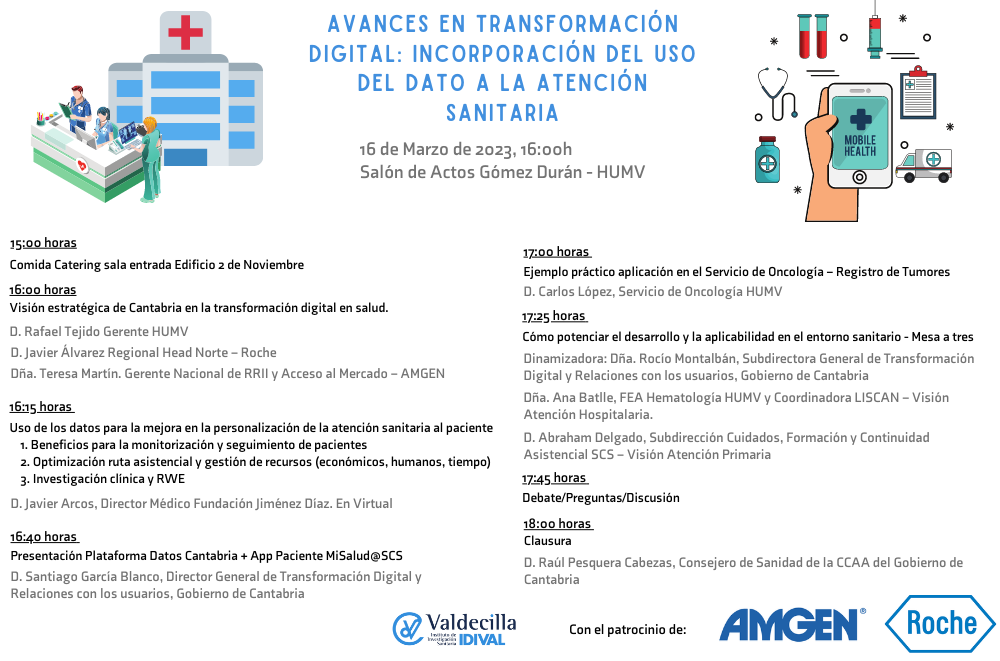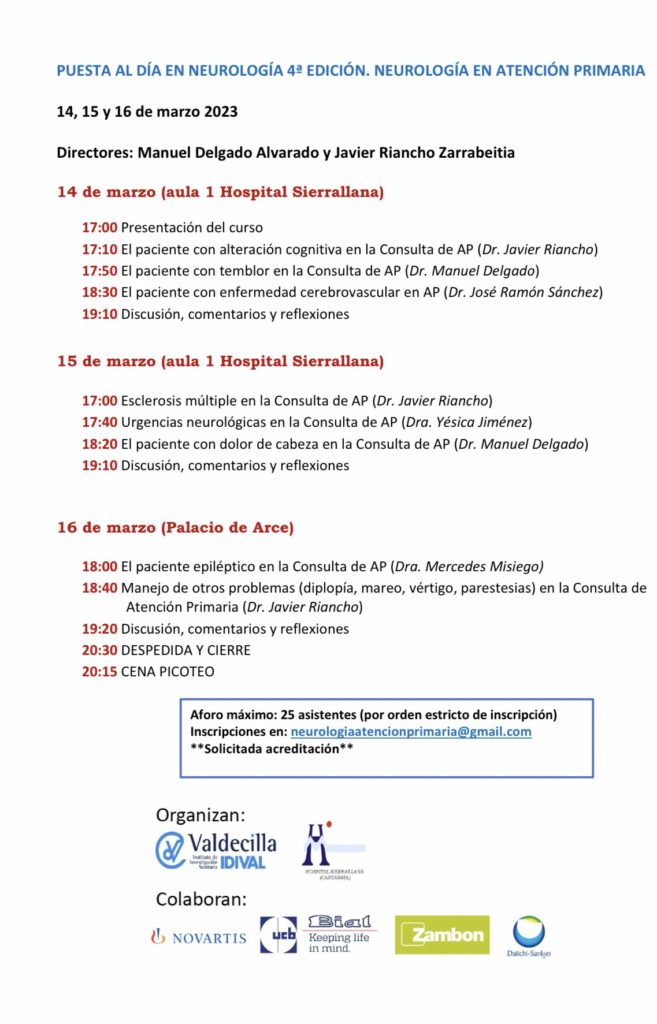The 13th Quality and Patient Safety Conference will be held in Santander on 3 and 4 May 2023. An open and participative discussion forum in which the patient safety culture is promoted and good practices carried out in healthcare centres are shared. These conferences have been held for many years in Cantabria and have been […]
The 13th Quality and Patient Safety Conference will be held in Santander on 3 and 4 May 2023. An open and participative discussion forum in which the patient safety culture is promoted and good practices carried out in healthcare centres are shared.
These conferences have been held for many years in Cantabria and have been very well received and well attended by the professionals of our Health Service. In 2023, visibility will be given to projects, activities or experiences developed by health professionals, giving the opportunity to participate with oral communications or in poster format.
The conference is open to all professionals, patients, relatives and anyone interested in quality and patient safety, subject to prior registration.
Registration for the conference is open from 3 to 24 April.
For professionals of the Cantabrian Health Service through SOFOSmoodle.
For external participants via the registration form on the conference website.
In order to obtain the course diploma it is necessary to attend 100% of the conference, as well as to complete the evaluation survey on the training activity. Accreditation has been requested from the Continuing Education Commission for the health professions in Cantabria for students previously registered for the conference.
Newsletter nº 315, 30 March
Newsletter nº 314, 24 March
Newsletter nº 313, 16 march
This Thursday, 16 March, the conference “Advances in digital transformation: incorporating the use of data into healthcare” will take place at the Marqués de Valdecilla University Hospital. The conference, focused on the opportunities of the use of Big Data and its applicability in healthcare environments, is organised by the IDIVAL Research Institute and sponsored by Roche and AMGEN.
The conference will present the strategic vision of digital transformation in the healthcare field and the opportunities and benefits offered by the use of data in clinical and healthcare research. The conference will present the Cantabria Data Platform + Patient App MiSalud@SCS and the tumour registry of the HUMV oncology services, applications and developments that have been launched and which have led to great progress and improvements for patients, users and society in general. These are just some examples of the opportunities offered by the management and exploitation of the use of health data, which represent a paradigm shift in the health system, generating more efficient systems.
The day will end with a round table debate on “How to promote development and applicability in the healthcare environment” in which the speakers will give their vision from the point of view of hospital care, primary care and from the point of view of healthcare management agents. The session will be closed by the Regional Minister of Health, Mr. Raúl Pesquera Cabezas.

Conference: Advances in digital transformation: incorporating the use of data into healthcare. 16th March
This Thursday, 16 March, the conference “Advances in digital transformation: incorporating the use of data into healthcare” will take place at the Marqués de Valdecilla University Hospital. The conference, focused on the opportunities of the use of Big Data and its applicability in healthcare environments, is organised by the IDIVAL Research Institute and sponsored by […]
Newsletter nº 312, 9th March
The 8th March we will have the presentations of Javier Isaac Lera Torres and Rebeca Abajas Bustillo, within the Progress Reports Valdecilla programme. The session will be held in the Innovation and User Experience Laboratory – Linnux at 14:00 hours, and will be broadcast live on the Zoom platform.
HEALTH TECHNOLOGY ASSESSMENT (HTA) FROM A HEALTH ECONOMICS PERSPECTIVE
SPEAKER: Javier Isaac Lera Torres
Javier Isaac Lera Torres holds a PhD in Economic Analysis Instruments from the University of Cantabria, University of Oviedo and University of the Basque Country since January 2021. His thesis, supervised by Dr David Cantarero Prieto and Dr Marta Pascual Sáez, dealt with the socioeconomic determinants of health use as well as the barriers to access and the social and economic return of health services. He is a member of IDIVAL’s R&D&I group on Health Economics and Health Services Management. He is currently a postdoctoral researcher in the framework of the H2020 TIMELY Project on artificial intelligence applied to prevention in coronary artery disease where his main work is Health Technology Assessment.
IMPLEMENTATION OF AN OUT-OF-HOSPITAL REGISTRY OF SEVERE TRAUMA CARE: EXTRAGE CANTABRIA PROJECT
SPEAKER: Rebeca Abajas Bustillo
Rebeca Abajas holds a degree in Nursing from the University of Cantabria, a master’s degree in research in care and an expert qualification in emergency nursing. In 2016, she completed her doctoral studies, obtaining an outstanding Cum Laude.
Dr. Abajas has directed several end-of-degree projects and doctoral theses and has participated in numerous conferences in Spain and abroad. She is currently PI in the NEXT-VAL R+D+i project “Epidemiology, characteristics of care and survival of severe trauma attended by the 061 Cantabria out-of-hospital emergency service (EXTRAGE project)” and works as an emergency nurse and associate lecturer LOU at the University of Cantabria.
The session will be held in a hybrid format, in person at the Linnux laboratory (free entrance until full capacity is reached) and online through the Zoom platform. To attend the virtual session, it is necessary to register through the following access link:
https://us06web.zoom.us/meeting/register/tZApcOyqrD0sHNYG7T3Lz-5xEwLGXhT9XZyz
The session will start at 14:00h. Each speaker’s talk will last about 20 minutes, followed by a short debate and agape.
If you have any questions or doubts, please contact proyectos1@idival.org and gesval4@idival.org
Next Progress Session
The 8th March we will have the presentations of Javier Isaac Lera Torres and Rebeca Abajas Bustillo, within the Progress Reports Valdecilla programme. The session will be held in the Innovation and User Experience Laboratory – Linnux at 14:00 hours, and will be broadcast live on the Zoom platform. HEALTH TECHNOLOGY ASSESSMENT (HTA) FROM A […]
On 14, 15 and 16 March the 4th edition of the course “Update in neurology. Neurology in Primary Care” directed by Manuel Delgado Alvarado and Javier Riancho Zarrabeitia, neurologists at Sierrallana Hospital.
During the course the main neurological problems will be reviewed with a practical approach.
Course limited to 25 places, last places available.
Registration by e-mail: neurologiaatencionprimaria@gmail.com
CFC accreditation requested

4th edition of the Neurology update course. Neurology in Primary Care
On 14, 15 and 16 March the 4th edition of the course “Update in neurology. Neurology in Primary Care” directed by Manuel Delgado Alvarado and Javier Riancho Zarrabeitia, neurologists at Sierrallana Hospital. During the course the main neurological problems will be reviewed with a practical approach. Course limited to 25 places, last places available. Registration […]
Researchers from the IDIVAL neurodegenerative diseases group and the Movement Disorders Unit of the Marqués de Valdecilla University Hospital (HUMV) have participated in a recent study, promoted by the Clínic Barcelona-IDIBAPS, which has detected alterations in the expression profile of four microRNAs, which could make it possible to detect the onset of genetic Parkinson’s disease and follow its evolution in people carrying mutations in the LRRK2 gene.
Parkinson’s disease is the most common neurodegenerative movement disorder. Most cases are of unknown origin, but 10% of patients have genetic mutations that cause the onset of the disease. Among these mutations, those affecting the gene encoding the LRRK2 enzyme stand out, as they are responsible for a large proportion of genetic cases. Thus, people with alterations in LRRK2 have a high risk of developing the disease, but the lack of biomarkers of progression prevents predicting the time of onset of the first symptoms.
The aim of the study, as explained by IDIBAPS group researcher Marta Soto, was to find biomarkers that allow early diagnosis of Parkinson’s disease, i.e. before the manifestation of motor alterations, and in a non-invasive way.
The study determines that in the brains of some of the subjects carrying mutations in LRRK2, although they do not yet show symptoms of Parkinson’s disease, a progressive loss of the neurons that produce dopamine can already be detected by means of a test called DaT-SPECT. Thanks to this test, the researchers in the study have been able to better classify patients and study changes in the expression of microRNAs at different stages of progression.
According to the results, there are specific alterations in carriers with biomarker potential. In fact, as Marta Soto has pointed out, four microRNAs have been identified (miR-4505, miR-8069, miR-6125, and miR-451ª) capable of discriminating carriers of the G2019S mutation of LRRK2 with symptoms and without symptoms.
“This finding is relevant, as it is the first time that the expression of microRNAs in premotor stages of Parkinson’s disease has been analysed and shows their usefulness as indicators of disease onset and progression,” Soto said.
The HUMV Movement Disorders Unit has participated in the study, headed by the head of the Neurology Section and researcher of the Neurodegenerative Diseases group at the Valdecilla Research Institute (IDIVAL), Jon Infante, who has also advanced that “the results of this study will allow us to anticipate and predict the onset of the disease in those people carrying the mutation whose risk of developing it until now we did not know”.
Early detection and new treatments
Exploring the long period between the onset of the disease and the appearance of the first symptoms is key to finding new mechanisms and treatments. Likewise, in the specific case of people carrying mutations in the LRRK2 gene, the administration of drugs that inhibit the enzyme is postulated as a therapeutic strategy that is already being evaluated in clinical trials. This reinforces the need for biomarkers to track patient progression in pre-symptomatic stages.
This study was funded by the Michael J. Fox Foundation for Parkinson’s Research and is essential to advance our understanding of Parkinson’s, a common disease whose incidence is expected to increase in the coming years. Its causes are known, although genetic and environmental factors are known to be involved, and in some cases it is difficult to diagnose accurately.
At the moment there is no curative treatment for the disease, but stabilising and symptom control measures are available. One of the main problems in finding effective therapies is precisely that by the time motor symptoms appear, the disease is already advanced and many of the brain’s dopamine-producing neurons, which are essential for motor function, have already died irreversibly.
For this reason, as Dr. Infante emphasised, it is essential to carry out research in the pre-symptomatic stages, both in the case of Parkinson’s and other neurodegenerative diseases, “if we want to apply treatments that restore or modify the course of these pathologies”.
Valdecilla-IDIVAL participates in a study that discovers blood biomarkers that could predict the onset of symptoms in a genetic Parkinson’s subtype
Researchers from the IDIVAL neurodegenerative diseases group and the Movement Disorders Unit of the Marqués de Valdecilla University Hospital (HUMV) have participated in a recent study, promoted by the Clínic Barcelona-IDIBAPS, which has detected alterations in the expression profile of four microRNAs, which could make it possible to detect the onset of genetic Parkinson’s disease […]



















